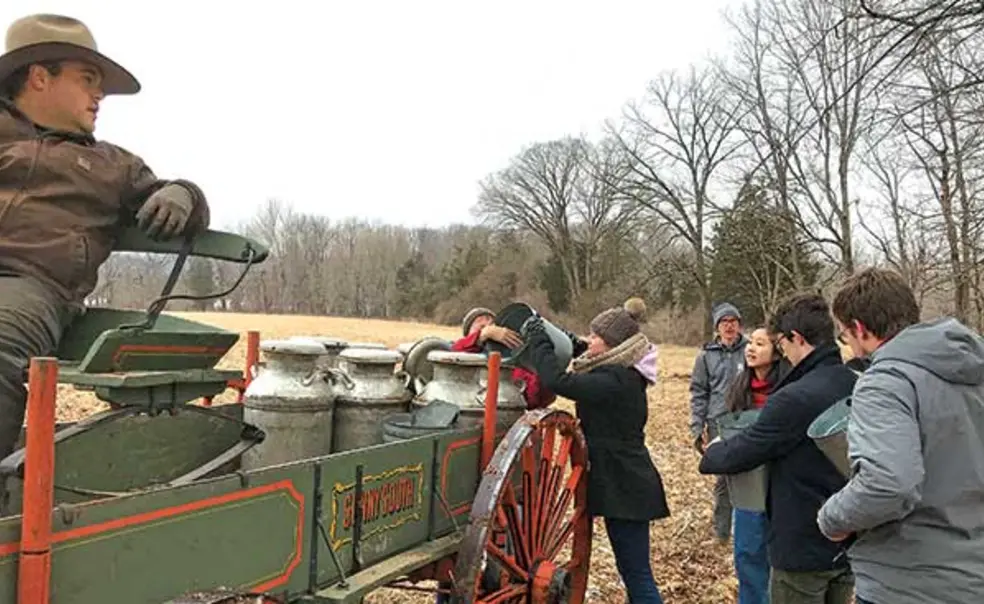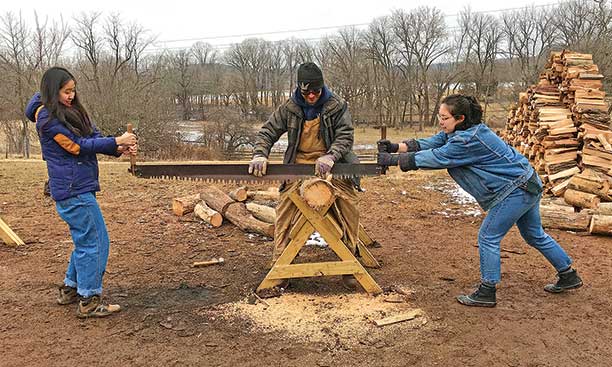Class Close-Up: Cultivating Lessons for Living A Good Life, Down on the Farm
Elizabeth Wright ’19 closed the lid of yet another silver bucket. “It’s empty,” she said, walking toward the next sugar maple tree, where Madelynn Prendergast ’19 was also checking a bucket for sap. The pair and their classmates in an American studies course called “American Agrarians: Ideas of Land, Labor, and Food” moved methodically along the tree line on a chilly March afternoon, transferring the thin, clear liquid from their buckets into canisters on the back of a wagon drawn by two Belgian draft horses.
“We boil that sap down next,” said a Howell Living History Farm worker standing next to the wagon. “Only 2 percent of that liquid becomes syrup.”
The group crossed a muddy field to the next stop on the maple-sugaring tour, where they watched another guide tap a spile — used to draw sap — into a tree. After successfully tapping their own tree, the group moved to a room with boiling equipment to learn about the evaporative process and the different products made on the farm using maple syrup. Then it was time to sample pancakes, churn butter, and chop firewood before piling into a van and heading back to campus.
“I like that this class isn’t academic in the traditional sense,” said Sofie Kim ’20, a PAW intern. “One of my hesitations for taking the class was that it is six hours a week, but I like that a lot of learning happens in ways different from a lot of other Princeton classes.”
The course meets for two seminar periods each week: On Tuesdays, students participate in traditional discussions and analyze texts related to agrarian thought. On Fridays, they apply that learning on field trips to five local farms and by working on a project to collect oral histories of agrarians in New Jersey.
The course is co-taught with the Princeton Theological Seminary, and 10 of the 23 students are seminarians. Seminars take place in the barn at the Farminary, a 20-acre farm owned by the seminary, where students plant spinach, mix compost, and raise baby chicks.
Associate research scholar Tessa Desmond, one of the course’s two instructors, hopes students learn about the history of agrarianism in the United States while considering ideas of self-sufficiency, treading lightly on the earth, and what it means to live a good life.
Desmond, who runs a 6-acre farm with her family, said she wants to help students “understand our relationship to the land a bit more and gain some sense of what they want to do with that recognition.”
Perhaps as evidence of that, Wright said she is rethinking her career goals, unsure whether she wants to pursue a traditional career path or find work as a butcher’s apprentice.
Jimin Kang ’21 said she has found lessons in developing relationships with the seminary students and local agrarians: “You learn to live slowly, think, and reflect with other people.”













No responses yet